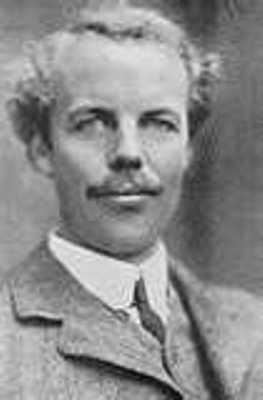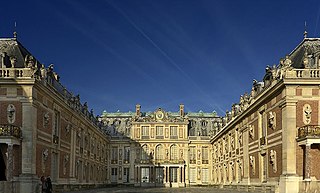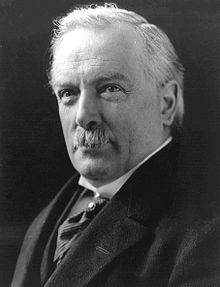
The Liberal Party was one of the two major political parties in the United Kingdom, along with the Conservative Party, in the 19th and early 20th centuries. Beginning as an alliance of Whigs, free trade–supporting Peelites, and reformist Radicals in the 1850s, by the end of the 19th century, it had formed four governments under William Gladstone. Despite being divided over the issue of Irish Home Rule, the party returned to government in 1905 and won a landslide victory in the 1906 general election.
Keynesian economics are the various macroeconomic theories and models of how aggregate demand strongly influences economic output and inflation. In the Keynesian view, aggregate demand does not necessarily equal the productive capacity of the economy. It is influenced by a host of factors that sometimes behave erratically and impact production, employment, and inflation.

John Maynard Keynes, 1st Baron Keynes was an English economist and philosopher whose ideas fundamentally changed the theory and practice of macroeconomics and the economic policies of governments. Originally trained in mathematics, he built on and greatly refined earlier work on the causes of business cycles. One of the most influential economists of the 20th century, he produced writings that are the basis for the school of thought known as Keynesian economics, and its various offshoots. His ideas, reformulated as New Keynesianism, are fundamental to mainstream macroeconomics. He is known as the "father of macroeconomics".

David Lloyd George, 1st Earl Lloyd-George of Dwyfor, was Prime Minister of the United Kingdom from 1916 to 1922. A Liberal Party politician from Wales, he was known for leading the United Kingdom during the First World War, for social-reform policies, for his role in the Paris Peace Conference, and for negotiating the establishment of the Irish Free State. He was the last Liberal Party prime minister; the party fell into third-party status shortly after the end of his premiership.

Arthur Cecil Pigou was an English economist. As a teacher and builder of the School of Economics at the University of Cambridge, he trained and influenced many Cambridge economists who went on to take chairs of economics around the world. His work covered various fields of economics, particularly welfare economics, but also included business cycle theory, unemployment, public finance, index numbers, and measurement of national output. His reputation was affected adversely by influential economic writers who used his work as the basis on which to define their own opposing views. He reluctantly served on several public committees, including the Cunliffe Committee and the 1919 Royal Commission on income tax.
The Great Depression in the United Kingdom also known as the Great Slump, was a period of national economic downturn in the 1930s, which had its origins in the global Great Depression. It was Britain's largest and most profound economic depression of the 20th century. The Great Depression originated in the United States in late 1929 and quickly spread to the world. Britain did not experience the boom that had characterized the U.S., Germany, Canada and Australia in the 1920s, so its effect appeared less severe. Britain's world trade fell by half (1929–33), the output of heavy industry fell by a third, employment profits plunged in nearly all sectors. At the depth in summer 1932, registered unemployed numbered 3.5 million, and many more had only part-time employment. However at the same time, from 1929 to 1933 employment dipped only to 94.9% relative to 1929 employment metrics and recovery was seen as early at 1933. The positive trend continued across real national income and wages. New houses built increased by 33% from 1929 to 1933, while profits, prices, export volume and value, and imports volume and value dropped. Overall, while all these metrics were concerning to parliament and businessmen along with devastating industrial regions, the common person especially in areas around London did not experience major hardship and even prospered.

John Allsebrook Simon, 1st Viscount Simon, was a British politician who held senior Cabinet posts from the beginning of the First World War to the end of the Second World War. He is one of three people to have served as Home Secretary, Foreign Secretary and Chancellor of the Exchequer, the others being Rab Butler and James Callaghan.

Benjamin Seebohm Rowntree, CH was an English sociological researcher, social reformer and industrialist. He is known in particular for his three studies of poverty in York, conducted in 1899, 1935, and 1951.
In the United Kingdom, the word liberalism can have any of several meanings. Scholars primarily use the term to refer to classical liberalism. The term can also mean economic liberalism, social liberalism or political liberalism. It can simply refer to the politics of the Liberal Democrats, a UK party formed from the merger of two centrist parties in 1988. Liberalism can occasionally have the imported American meaning; however, the derogatory connotation is much weaker in the UK than in the US, and social liberals from both the left and right wing continue to use liberal and illiberal to describe themselves and their opponents, respectively.

In the politics of the United Kingdom, a National Government is a coalition of some or all of the major political parties. In a historical sense, it refers primarily to the governments of Ramsay MacDonald, Stanley Baldwin and Neville Chamberlain which held office from 1931 until 1940.

The Economic Consequences of the Peace (1919) is a book written and published by the British economist John Maynard Keynes. After the First World War, Keynes attended the Paris Peace Conference of 1919 as a delegate of the British Treasury. At the conference as a representative of the British Treasury and deputy to the Chancellor of the Exchequer on the Supreme Economic Council he had publicly urged and secretly arranged on behalf of 'Rosie' Wemyss for a discontinuing of the food blockade of Germany but became ill and on his return found that there was 'no hope' of an economically sustainable settlement, and so resigned. In this book, he presents his arguments for a much less onerous treaty for a wider readership, not just for the sake of German civilians but for the sake of the economic well-being of all of Europe and beyond, including the Allied Powers, which the Treaty of Versailles and its associated treaties endangered.

Sir Henry Roy Forbes Harrod was an English economist. He is best known for writing The Life of John Maynard Keynes (1951) and for the development of the Harrod–Domar model, which he and Evsey Domar developed independently. He is also known for his International Economics, a former standard textbook, the first edition of which contained some observations and ruminations that would foreshadow theories developed independently by later scholars.

The National Insurance Act 1911 created National Insurance, originally a system of health insurance for industrial workers in Great Britain based on contributions from employers, the government, and the workers themselves. It was one of the foundations of the modern welfare state. It also provided unemployment insurance for designated cyclical industries. It formed part of the wider social welfare reforms of the Liberal Governments of 1906–1915, led by Henry Campbell-Bannerman and H. H. Asquith. David Lloyd George, the Liberal Chancellor of the Exchequer, was the prime moving force behind its design, negotiations with doctors and other interest groups, and final passage, assisted by Home Secretary Winston Churchill.

John Ramsay Bryce Muir was a British historian, Liberal Party politician and thinker who made a significant contribution to the development of liberal political philosophy in the 1920s and 1930s through his work on domestic industrial policy and his promotion of the international policy of interdependency.
Richard Thomas Evans was a British Liberal Party politician.

The Heavenly Twins was the name assigned to two British delegates, the Judge Lord Sumner and the Banker Lord Cunliffe, during the 1919 Treaty of Versailles negotiations who were to set the terms of the peace to be imposed on Germany following the end of World War I. The two lords, together with the Prime Minister of Australia Billy Hughes, were responsible for presenting the British and British Dominions' case concerning the amount of compensatory payments, or war reparations, that were to be extracted from Germany.
The Macmillan Committee, officially known as the Committee on Finance and Industry, was a committee, composed mostly of economists, formed by the British government after the 1929 stock market crash to determine the root causes of the depressed economy of the United Kingdom. The Macmillan Committee was formed in 1929 by Royal Command 3897, and it was tasked with determining whether the contemporary banking and financial system was helping or hindering British trade and industry. Scottish lawyer Hugh Pattison Macmillan was named as its chairman, although due to his lack of economic or financial expertise, he largely "remained in the background". Other members of the committee included Ernest Bevin, Lord Bradbury, R. H. Brand, Theodore Gregory, John Maynard Keynes, and Reginald McKenna.

Sir Hubert Douglas Henderson, was a British economist and Liberal Party politician.
In the United Kingdom, the interwar period (1918–1939) entered a period of relative stability after the Partition of Ireland, although it was also characterised by economic stagnation. In politics, the Liberal Party collapsed and the Labour Party became the main challenger to the dominant Conservative Party throughout the period. The Great Depression affected Britain less severely economically and politically than other major nations, although some areas still suffered from severe long-term unemployment and hardship, especially mining districts and in Scotland and North West England.
Marxism and Keynesianism is a method of understanding and comparing the works of influential economists John Maynard Keynes and Karl Marx. Both men's works has fostered respective schools of economic thought that have had significant influence in various academic circles as well as in influencing government policy of various states. Keynes' work found popularity in developed liberal economies following the Great Depression and World War II, most notably Franklin D. Roosevelt's New Deal in the United States in which strong industrial production was backed by strong unions and government support. Marx's work, with varying degrees of faithfulness, led the way to a number of socialist states, notably the Soviet Union and the People's Republic of China. The immense influence of both Marxian and Keynesian schools has led to numerous comparisons of the work of both economists along with synthesis of both schools.














